七下Unit 10 I'd like some noodles.单元复习课件(共30张PPT)
文档属性
| 名称 | 七下Unit 10 I'd like some noodles.单元复习课件(共30张PPT) |
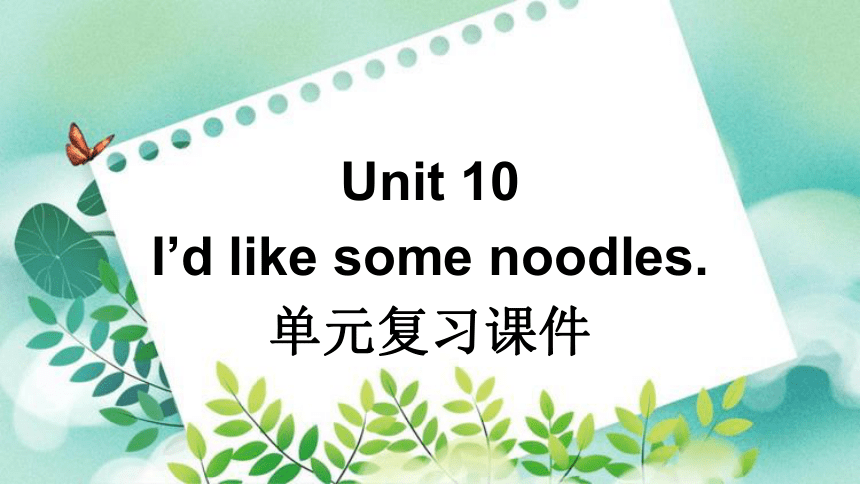
|
|
| 格式 | pptx | ||
| 文件大小 | 5.9MB | ||
| 资源类型 | 教案 | ||
| 版本资源 | 人教新目标(Go for it)版 | ||
| 科目 | 英语 | ||
| 更新时间 | 2023-05-19 00:00:00 | ||
图片预览


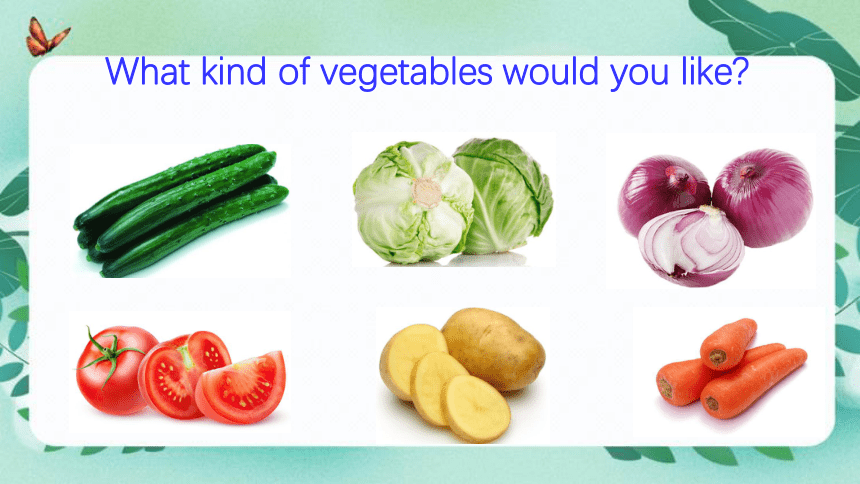
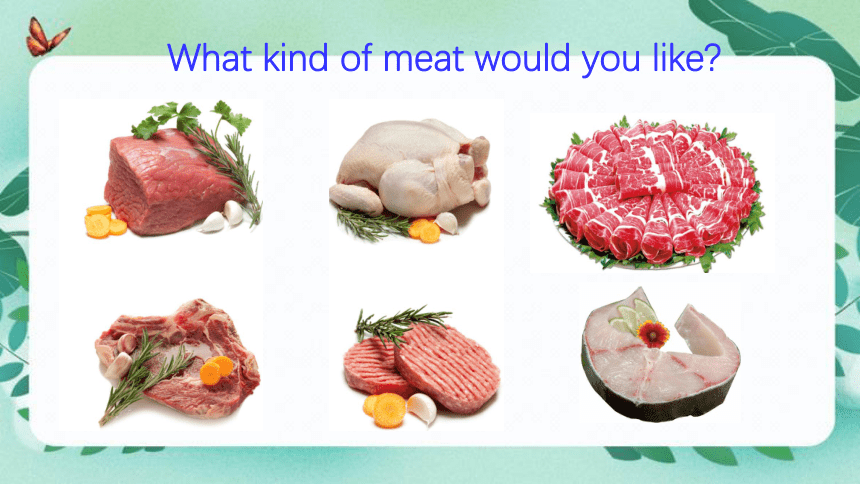
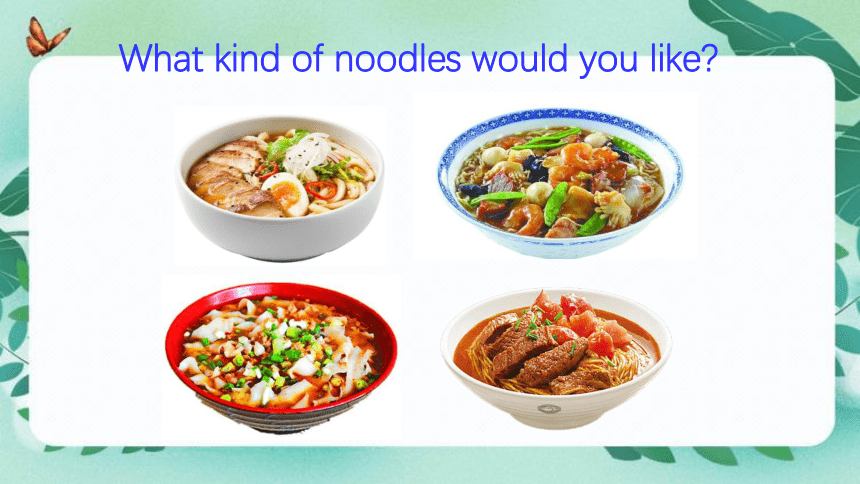
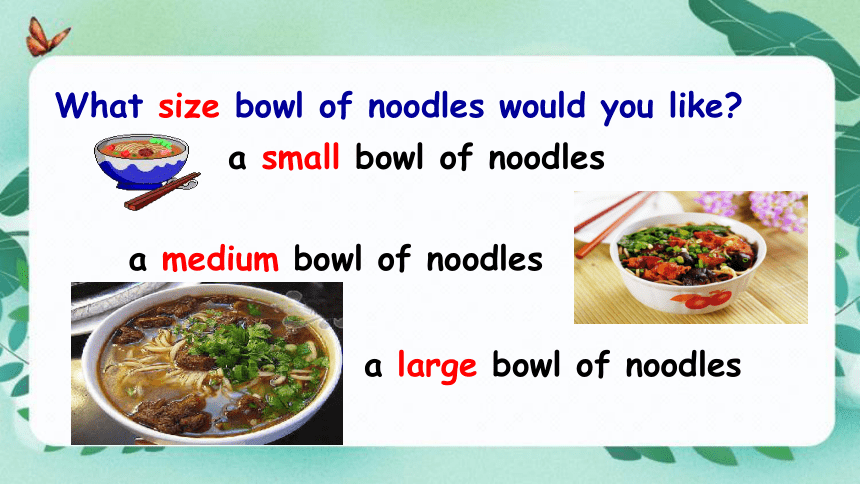
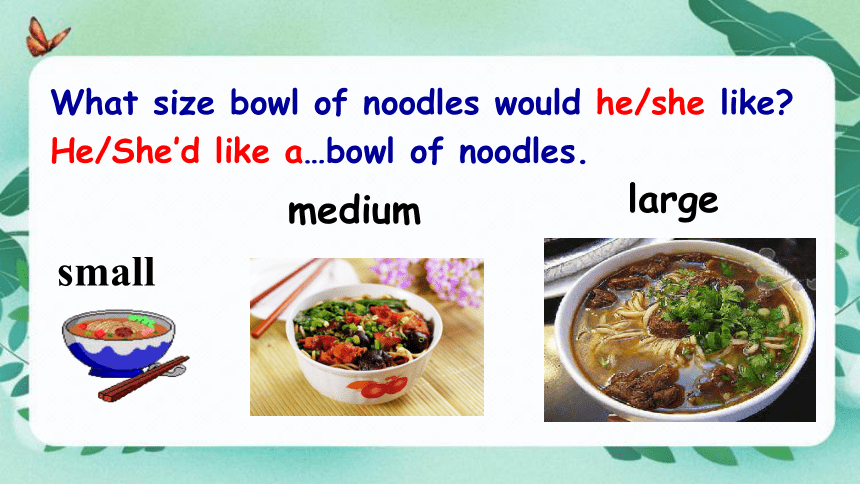
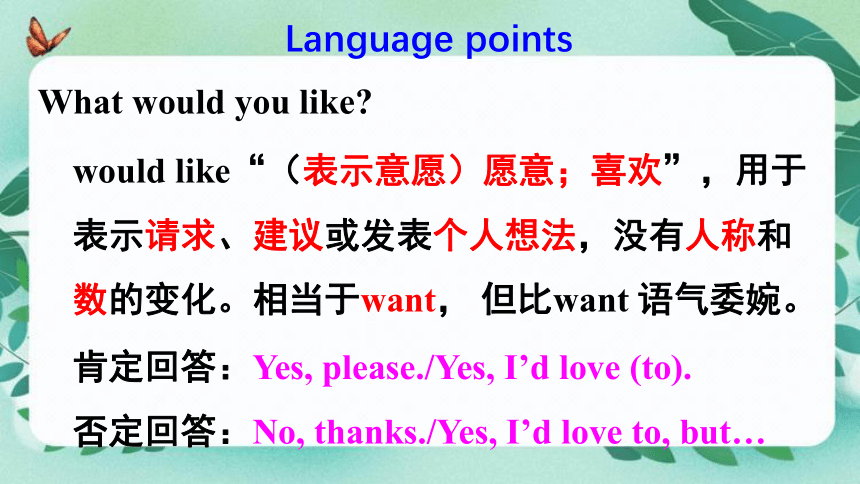
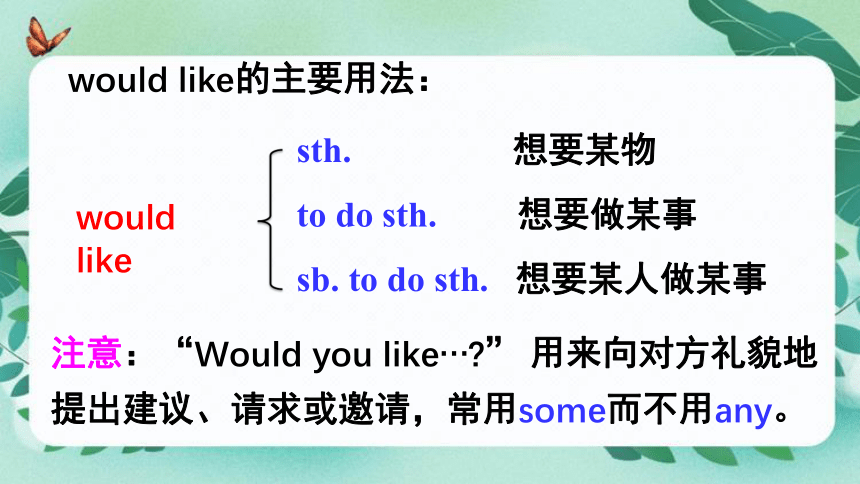
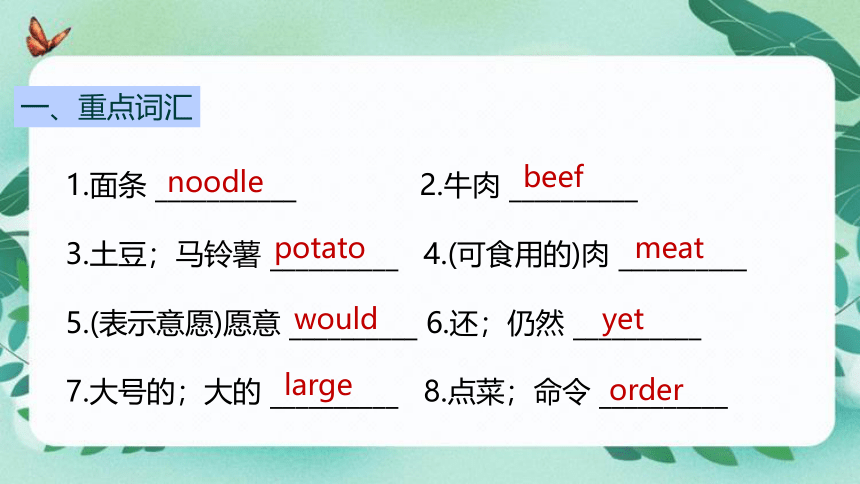
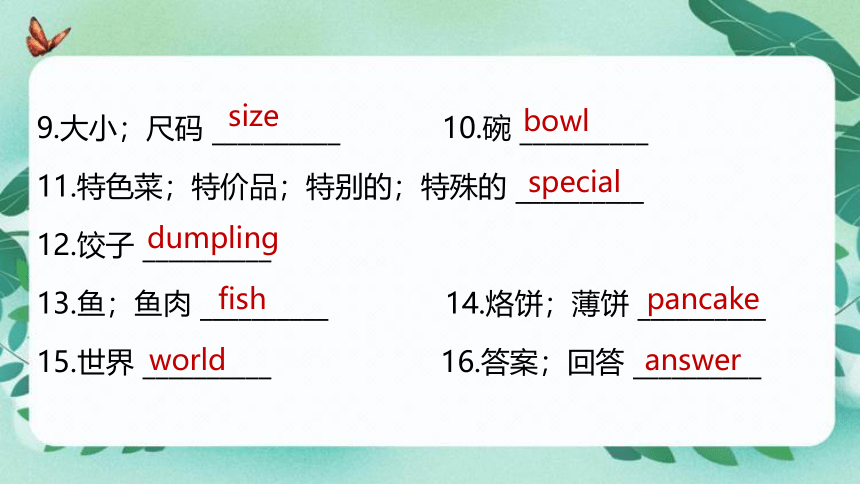
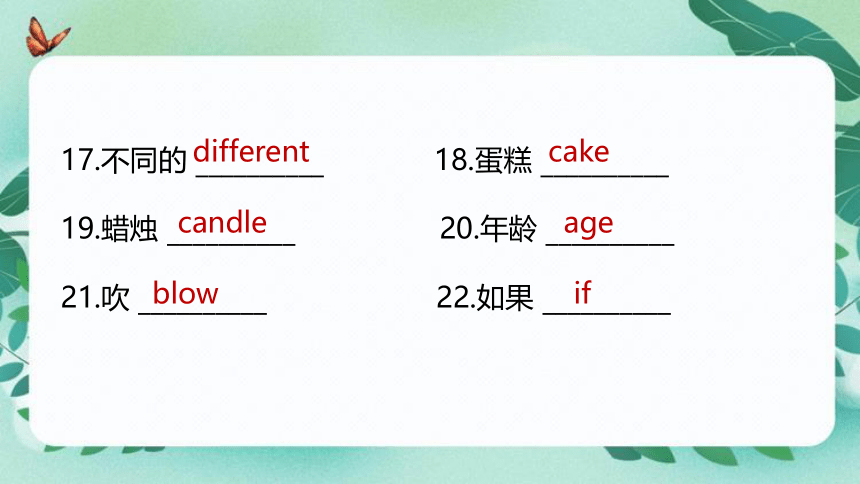
文档简介
(共30张PPT)
Unit 10
I’d like some noodles.
单元复习课件
What kind of fruits would you like
What kind of vegetables would you like
What kind of meat would you like
What kind of noodles would you like
What size bowl of noodles would you like
a small bowl of noodles
a medium bowl of noodles
a large bowl of noodles
small
medium
large
What size bowl of noodles would he/she like
He/She’d like a…bowl of noodles.
Language points
What would you like
would like“(表示意愿)愿意;喜欢”,用于表示请求、建议或发表个人想法,没有人称和数的变化。相当于want, 但比want 语气委婉。
肯定回答:Yes, please./Yes, I’d love (to).
否定回答:No, thanks./Yes, I’d love to, but…
sth. 想要某物
to do sth. 想要做某事
sb. to do sth. 想要某人做某事
would like的主要用法:
would like
注意:“Would you like… ” 用来向对方礼貌地提出建议、请求或邀请,常用some而不用any。
一、重点词汇
1.面条 ___________ 2.牛肉 __________
3.土豆;马铃薯 __________ 4.(可食用的)肉 __________
5.(表示意愿)愿意 __________ 6.还;仍然 __________
7.大号的;大的 __________ 8.点菜;命令 __________
noodle
beef
potato
meat
would
yet
large
order
9.大小;尺码 __________ 10.碗 __________
11.特色菜;特价品;特别的;特殊的 __________
12.饺子 __________
13.鱼;鱼肉 __________ 14.烙饼;薄饼 __________
15.世界 __________ 16.答案;回答 __________
size
bowl
special
dumpling
fish
pancake
world
answer
17.不同的 __________ 18.蛋糕 __________
19.蜡烛 __________ 20.年龄 __________
21.吹 __________ 22.如果 __________
different
cake
candle
age
blow
if
23.将要;会 __________ 24.糖果 __________
25.幸运的 __________ 26.受欢迎的;普遍的 __________
27.想法;主意 __________
will
candy
lucky
popular
idea
二、词块归纳
1.牛肉面 ____________________
2.点菜 ____________________
3.(表意愿)愿意;喜欢 ____________________
4.牛肉汤 ____________________
5.多大(碗) ____________________
beef noodles
take one’s order
would like
beef soup
what size
6.哪种 ____________________
7.西红柿蛋汤 _________________________
8.一(大)碗……____________________
9.牛肉胡萝卜面 ________________________
10.绿茶 ____________________
what kind of
tomato and egg soup
one large (bowl) of
beef and carrot noodles
green tea
11.生日蛋糕 ____________________
12.在不同的国家 _______________________
13.……的数量 ____________________
14.许愿 ____________________
15.吹灭 ____________________
birthday cake
in different countries
the number of
make a wish
blow out
16.一口气;一下子 ____________________
17.(梦想)实现 ____________________
18.受欢迎;流行 ____________________
19.切碎 ____________________
20.长寿的象征 _________________________
in one go
come true
get popular
cut up
a symbol of long life
21.给……带来好运 _______________________
22.把……放在……里 ____________________
23.短缺;缺乏 ____________________
24.戴上;穿上 ____________________
25.世界各地 ____________________
bring good luck to...
put... in ...
be short of
put on
around the world
三、核心句型
1.你想要什么?
______ ______ _____ _____
2.您现在点菜吗?
_____ _____ _____ _______ _______
3.---牛肉汤里有蔬菜吗?
---是的,有一些西红柿。
---______ ________ _____ vegetables in the beef soup
---Yes.______ ____ some tomatoes.
What would you like
May I take your order
Are there any
There are
4.我们想要一碗牛肉汤。
We'd like ________ ________ _____ beef soup.
5.---你要多大碗的?
---我想要大碗的,谢谢。
---______ ________ would you like
---I'd like______ ________ _________,please.
6.---你想要哪种面?
---我想要牛肉面,谢谢。
---______ _______ _____ ________ would you like
---I'd like ________ _______,please.
a/one bowl of
What size
a large bowl
What kind of noodles
beef noodles
7.你想要大碗的吗?
______ ____ _____ a large bowl?
8.人们在过生日时喜欢吃什么?
______ _______ people ______ ____ _____on their birthday
9.过生日的人必须许愿,然后吹灭蜡烛。
The birthday person must ______ ____ _____ and ______ ____ the candles.
Would you like
What would
like to eat
make a wish
blow out
10.如果他或她一口气吹灭了所有的蜡烛,(他或她的)愿望就会实现。
If he or she ______ ____ all the candles ___ ____ _____,the wish ______ _______ ________.
11.在英国,人们有时在生日蛋糕里放一颗糖果。
In the UK,people sometimes ______ ____ _____ ____ a birthday cake.
12. 在中国,过生日时吃蛋糕变得流行起来。
In China,it is ________ _________ _____ ________ cake on your birthday.
blows out
in one go
will come true
put a candy in
getting popular to have
13.他们从来不切断面条,因为长长的面条是长寿的象征。
They never ____ _____ the noodles because the long noodles are ____ _________ _____long life.
14.它们给过生日的人带来好运。
They ______ _______ _____ ______ the birthday person.
cut up
a symbol of
bring good luck to
I’d= I would
She’d= She would
Grammar Focus
What kind of noodles would you like I’d like beef noodles, please.
What size would you like I’d like a large bowl, please.
Would you like a large bowl Yes, please.
Is there any meat in the tomato and egg soup No, there isn’t any./
No, there’s no meat.
Countable nouns Uncountable nouns Countable and uncountable nouns
bowls, apples, carrots, oranges, strawberries beef, meat, milk, mutton, water chicken, salad,
ice-cream,
cabbage,cake
可数名词和不可数名词
可数名词:可以计数的名词称为可数名词。
一般有单数与复数两种形式,前面可加a,
an或数词来修饰。
不可数名词:不可计数的名词称为不可数名词。
没有复数形式,前面不能用不定冠词a,an, 也不
能直接加数词,但可以跟某些量词短语搭配,表
示数量。
如:a glass of water, two cups of tea.
Countable nouns
Uncountable nouns
potatoes
tomatoes
onions
strawberries
apples
eggs
oranges
beef
mutton
chicken
rice
porridge
orange juice
green tea
1. 可数名词:可数名词有单数、复数之分。
其复数形式一般要加-s或-es。
e.g. potato — ____________;
tomato — ____________
2. 不可数名词没有复数形式,只有单数形式。
e.g. some _________ (米饭);
a lot of ________ (牛肉)
rice
beef
potatoes
tomatoes
不可数名词表示数量的多少时,必须
与表示数量的名词连用,即“数词 +表示
数量的名词(可数名词)+ of + 不可数名词”。
e.g. 两玻璃杯果汁
_____ ________ of juice
三碗米饭
_______ ______ of rice
three bowls
two glasses
(2) 不可数名词作主语时,谓语动词只能
用单数形式。
e.g. 在碗里有一些羊肉汤。
There ___ ______ mutton soup in the bowl.
【拓展】如果不可数名词前有复数名词
短语修饰时,谓语动词须用复数形式。
房间里有两袋子大米。
______ ____ two bags of rice in the room.
is some
There are
Unit 10
I’d like some noodles.
单元复习课件
What kind of fruits would you like
What kind of vegetables would you like
What kind of meat would you like
What kind of noodles would you like
What size bowl of noodles would you like
a small bowl of noodles
a medium bowl of noodles
a large bowl of noodles
small
medium
large
What size bowl of noodles would he/she like
He/She’d like a…bowl of noodles.
Language points
What would you like
would like“(表示意愿)愿意;喜欢”,用于表示请求、建议或发表个人想法,没有人称和数的变化。相当于want, 但比want 语气委婉。
肯定回答:Yes, please./Yes, I’d love (to).
否定回答:No, thanks./Yes, I’d love to, but…
sth. 想要某物
to do sth. 想要做某事
sb. to do sth. 想要某人做某事
would like的主要用法:
would like
注意:“Would you like… ” 用来向对方礼貌地提出建议、请求或邀请,常用some而不用any。
一、重点词汇
1.面条 ___________ 2.牛肉 __________
3.土豆;马铃薯 __________ 4.(可食用的)肉 __________
5.(表示意愿)愿意 __________ 6.还;仍然 __________
7.大号的;大的 __________ 8.点菜;命令 __________
noodle
beef
potato
meat
would
yet
large
order
9.大小;尺码 __________ 10.碗 __________
11.特色菜;特价品;特别的;特殊的 __________
12.饺子 __________
13.鱼;鱼肉 __________ 14.烙饼;薄饼 __________
15.世界 __________ 16.答案;回答 __________
size
bowl
special
dumpling
fish
pancake
world
answer
17.不同的 __________ 18.蛋糕 __________
19.蜡烛 __________ 20.年龄 __________
21.吹 __________ 22.如果 __________
different
cake
candle
age
blow
if
23.将要;会 __________ 24.糖果 __________
25.幸运的 __________ 26.受欢迎的;普遍的 __________
27.想法;主意 __________
will
candy
lucky
popular
idea
二、词块归纳
1.牛肉面 ____________________
2.点菜 ____________________
3.(表意愿)愿意;喜欢 ____________________
4.牛肉汤 ____________________
5.多大(碗) ____________________
beef noodles
take one’s order
would like
beef soup
what size
6.哪种 ____________________
7.西红柿蛋汤 _________________________
8.一(大)碗……____________________
9.牛肉胡萝卜面 ________________________
10.绿茶 ____________________
what kind of
tomato and egg soup
one large (bowl) of
beef and carrot noodles
green tea
11.生日蛋糕 ____________________
12.在不同的国家 _______________________
13.……的数量 ____________________
14.许愿 ____________________
15.吹灭 ____________________
birthday cake
in different countries
the number of
make a wish
blow out
16.一口气;一下子 ____________________
17.(梦想)实现 ____________________
18.受欢迎;流行 ____________________
19.切碎 ____________________
20.长寿的象征 _________________________
in one go
come true
get popular
cut up
a symbol of long life
21.给……带来好运 _______________________
22.把……放在……里 ____________________
23.短缺;缺乏 ____________________
24.戴上;穿上 ____________________
25.世界各地 ____________________
bring good luck to...
put... in ...
be short of
put on
around the world
三、核心句型
1.你想要什么?
______ ______ _____ _____
2.您现在点菜吗?
_____ _____ _____ _______ _______
3.---牛肉汤里有蔬菜吗?
---是的,有一些西红柿。
---______ ________ _____ vegetables in the beef soup
---Yes.______ ____ some tomatoes.
What would you like
May I take your order
Are there any
There are
4.我们想要一碗牛肉汤。
We'd like ________ ________ _____ beef soup.
5.---你要多大碗的?
---我想要大碗的,谢谢。
---______ ________ would you like
---I'd like______ ________ _________,please.
6.---你想要哪种面?
---我想要牛肉面,谢谢。
---______ _______ _____ ________ would you like
---I'd like ________ _______,please.
a/one bowl of
What size
a large bowl
What kind of noodles
beef noodles
7.你想要大碗的吗?
______ ____ _____ a large bowl?
8.人们在过生日时喜欢吃什么?
______ _______ people ______ ____ _____on their birthday
9.过生日的人必须许愿,然后吹灭蜡烛。
The birthday person must ______ ____ _____ and ______ ____ the candles.
Would you like
What would
like to eat
make a wish
blow out
10.如果他或她一口气吹灭了所有的蜡烛,(他或她的)愿望就会实现。
If he or she ______ ____ all the candles ___ ____ _____,the wish ______ _______ ________.
11.在英国,人们有时在生日蛋糕里放一颗糖果。
In the UK,people sometimes ______ ____ _____ ____ a birthday cake.
12. 在中国,过生日时吃蛋糕变得流行起来。
In China,it is ________ _________ _____ ________ cake on your birthday.
blows out
in one go
will come true
put a candy in
getting popular to have
13.他们从来不切断面条,因为长长的面条是长寿的象征。
They never ____ _____ the noodles because the long noodles are ____ _________ _____long life.
14.它们给过生日的人带来好运。
They ______ _______ _____ ______ the birthday person.
cut up
a symbol of
bring good luck to
I’d= I would
She’d= She would
Grammar Focus
What kind of noodles would you like I’d like beef noodles, please.
What size would you like I’d like a large bowl, please.
Would you like a large bowl Yes, please.
Is there any meat in the tomato and egg soup No, there isn’t any./
No, there’s no meat.
Countable nouns Uncountable nouns Countable and uncountable nouns
bowls, apples, carrots, oranges, strawberries beef, meat, milk, mutton, water chicken, salad,
ice-cream,
cabbage,cake
可数名词和不可数名词
可数名词:可以计数的名词称为可数名词。
一般有单数与复数两种形式,前面可加a,
an或数词来修饰。
不可数名词:不可计数的名词称为不可数名词。
没有复数形式,前面不能用不定冠词a,an, 也不
能直接加数词,但可以跟某些量词短语搭配,表
示数量。
如:a glass of water, two cups of tea.
Countable nouns
Uncountable nouns
potatoes
tomatoes
onions
strawberries
apples
eggs
oranges
beef
mutton
chicken
rice
porridge
orange juice
green tea
1. 可数名词:可数名词有单数、复数之分。
其复数形式一般要加-s或-es。
e.g. potato — ____________;
tomato — ____________
2. 不可数名词没有复数形式,只有单数形式。
e.g. some _________ (米饭);
a lot of ________ (牛肉)
rice
beef
potatoes
tomatoes
不可数名词表示数量的多少时,必须
与表示数量的名词连用,即“数词 +表示
数量的名词(可数名词)+ of + 不可数名词”。
e.g. 两玻璃杯果汁
_____ ________ of juice
三碗米饭
_______ ______ of rice
three bowls
two glasses
(2) 不可数名词作主语时,谓语动词只能
用单数形式。
e.g. 在碗里有一些羊肉汤。
There ___ ______ mutton soup in the bowl.
【拓展】如果不可数名词前有复数名词
短语修饰时,谓语动词须用复数形式。
房间里有两袋子大米。
______ ____ two bags of rice in the room.
is some
There are
同课章节目录
- Unit 1 Can you play the guitar?
- Section A
- Section B
- Unit 2 What time do you go to school?
- Section A
- Section B
- Unit 3 How do you get to school?
- Section A
- Section B
- Unit 4 Don't eat in class.
- Section A
- Section B
- Unit 5 Why do you like pandas?
- Section A
- Section B
- Unit 6 I'm watching TV.
- Section A
- Section B
- Review of Units 1-6
- Unit 7 It's raining!
- Section A
- Section B
- Unit 8 Is there a post office near here?
- Section A
- Section B
- Unit 9 What does he look like?
- Section A
- Section B
- Unit 10 I'd like some noodles.
- Section A
- Section B
- Unit 11 How was your school trip?
- Section A
- Section B
- Unit 12 What did you do last weekend?
- Section A
- Section B
